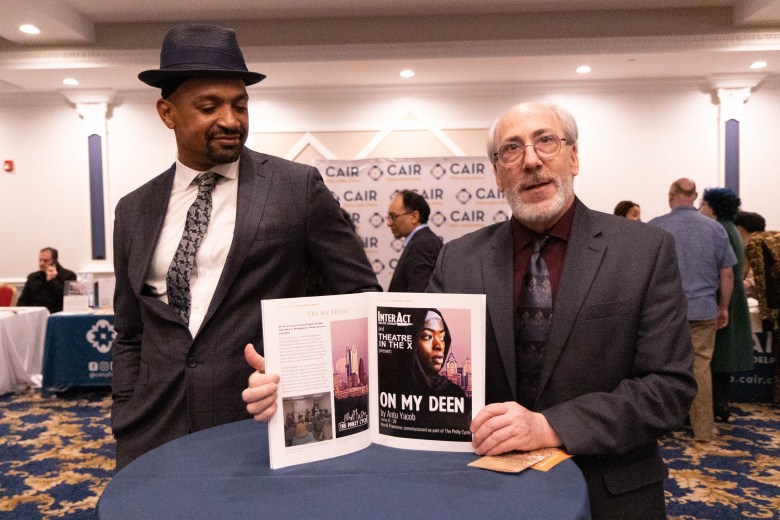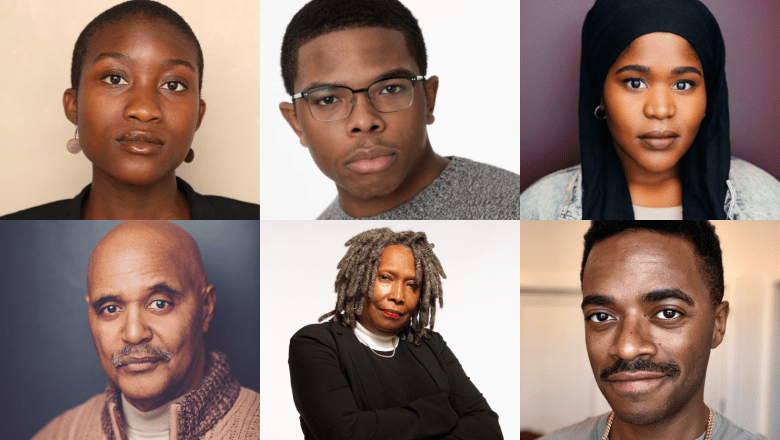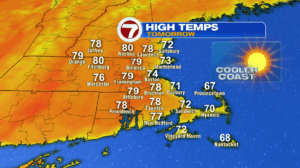One of the fantastic things about living in Philadelphia is that, without being overwhelming, our city remains big enough to hold many worlds – there are always new people, new places, new ideas to explore.
It’s the city you know, full of entire categories of people you might not.
For Seth Rozin, artistic director of InterAct Theatre Company, one of those categories was Black Muslims – not Muslims from the Middle East, or from Africa or Asia, not immigrants or children of immigrants, but Muslims born and bred in this city.
“They’re home-grown,” he said.
And, he noticed, their stories rarely show up on stage.
For InterAct, that’s changing June 6, as it launches “On My Deen,” about Philly’s Muslim community. A world premiere, “On My Deen” is the first of three plays in InterAct’s three-year Philly Cycle, marketed as “The City You Know, the People You Don’t.”
“We realized that there were lots of kinds of people and stories that were rarely told, if at all, and we thought it would be important to find ways to tell their stories,” Rozin said.

The William Penn Foundation agreed and underwrote the Philly Cycle with a $650,000 grant so InterAct could connect with three underrepresented groups, search for three playwrights to work with people in those communities on plot themes and ideas, and finally, produce the plays, one year at a time, on stage.
Next year’s Philly Cycle play will focus on Philly’s Cambodian, Vietnamese and Laotian communities. The series will conclude in 2027 with a play about nurses.
Directed by Amina Robinson, “On My Deen” runs through June 28 and is co-produced by InterAct and Theatre in the X, a theater group drawing its name from West Philadelphia’s Malcolm X Park where it performs. Malcolm X, a Black revolutionary, was an outspoken advocate for Islam within the Black community and a leader in establishing Islam Temple 12 in Philadelphia.
Philly’s Muslims “are not invisible,” Rozin said. “You walk almost anywhere in the city, you will see people – women in head scarves.
“Nobody seemed to know much about this community,” Rozin said. “I wasn’t surprised. When most people think of immigrant Muslims, they think of people from the Middle East, they think of Arabs. If you are on the right, you may think of them as a threat or as terroristic. If you are on the left, you may think of them as being anti-LGBTQ and misogynistic.
“They are a big community that works hard and lives under the radar, but not as a threat,” he said. “They just go about their business, living and going about their faith and participating in city life as regular people.”
Estimates vary widely about the number of Muslims in Philadelphia and the region. Some say as many as 300,000. Based on a nationwide survey, the Pew Research Center estimates that Muslims comprise about 1% of the Philly Metro area, which equates to around 60,000 people.
The Philadelphia area, Rozin came to learn, has been important in the national development of Islam in the U.S., and in Philadelphia.
Starting in 1930 and particularly in the 1960s, there was “a large percentage of African-Americans who were introduced to Islam through the Nation of Islam – not Sunni Islam, which is practiced throughout the majority of the world,” said playwright Antu Yacob. “The Nation catered to empowering Black people. It catered to making them honor their bodies and their minds and looking at themselves as beautiful human beings at a time when no one was saying that about them.”
Over time, she said, there have been shifts within the African-American Muslim community toward Sunni and other Islamic sects.

Some of that history shows up in the life of the main character, Faye Ann.
Michael, the other lead character, wishes his friendship with Faye Ann would turn into something more. He’s her best friend, but the questions they ask each other about life, love, and even God, aren’t bringing them closer together.
Will they or won’t they be a couple? That’s a familiar plot question.
Faye Ann, later Fatima, “comes in [to Islam] through the Nation of Islam as a young person and she follows each of its changes. She lands on Sunni,” Yacob said. “In addition to all of that, it’s a love story. You are tracking her faith journey. But it’s not like you are watching a history lesson.
“Her best friend is also the love of her life. He’s opposed to the changes she’s making,” Yacob said. “They are navigating what liberation could be as a Black person. She finds it through Islam, in all its forms, and he doesn’t.”
Their relationship evolves over decades, from 1962 to 2013. The title of the six-character play, “On My Deen,” refers to the religious path laid out by Islam.
Yacob herself has an evolving religious identity. She was born in Ethiopia and went to an Islamic school as a child. When her family moved to the U.S., it joined the Jehovah’s Witnesses. Later her mother reverted to Islam, giving her children the freedom to choose any faith as long as they developed a relationship with God.
Yacob, who teaches at Rutgers University, describes herself as Muslim, “and a work in progress.”
Community outreach
To develop the play, Rozin and Yacob built relationships with the local branch of the Council on American-Islamic Relations (CAIR) as well as local imams. They visited a masjid in Chester and met the imam and his wife. The story of their relationship became part of the basis for the play.
Rozin said one imam told him that Muslims support the arts, but often don’t attend plays because they worry that they’ll include offensive language or intimacy. Yacob kept that in mind as she wrote the play.
To accommodate prayer schedules, Rozin adjusted the times for the Saturday shows. Typically, there’s a matinee at 2 p.m. and an evening performance at 7, but for the run of the play, Saturday shows will be at 10 a.m. and 3 p.m.
“Our hope is that a lot of people in the community will come to those performances,” he said. “We wanted to show that we are serious about this, and we want them to come and engage with us.”
As is usually the case with InterAct, talkbacks and audience discussions follow many shows. The Saturday discussions are more focused on themes in the play. Guests on Wednesdays, Thursdays and Sundays include members and leaders of the Muslim community.
There’s a Black affinity night on June 19 and a Muslim Affinity Day on June 22.
FYI
“On My Deen,” InterAct Theatre Co., June 6-28, Proscenium Theatre at The Drake, 302 S. Hicks St., Phila. 215-569-8079.



